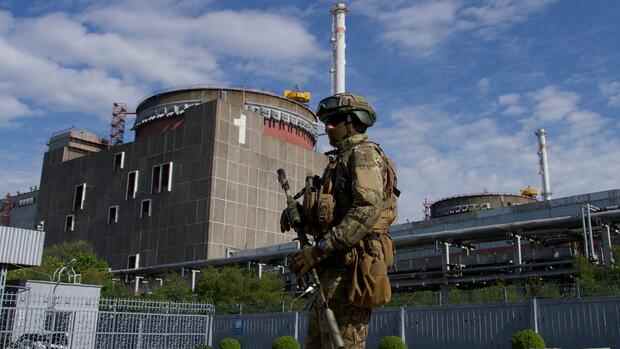Riga In view of the tense situation at the Zaporizhia nuclear power plant in eastern Ukraine, there are growing concerns about a nuclear accident. “Any attack on a nuclear power plant is a suicidal thing,” UN Secretary-General António Guterres said on a visit to Japan on Monday.
Guterres called for international access to the site. The government in Kyiv advocated making the area around the kiln a demilitarized zone. The head of the state-owned Ukrainian nuclear company Energoatom, Petro Kotin, also called for peacekeeping troops to be stationed at the power plant.
On Monday afternoon, Russia emphasized that it was open to an international inspection of the plant. The Foreign Ministry in Moscow announced on Monday that inspectors from the UN Atomic Energy Agency (IAEA) should examine the power plant in south-eastern Ukraine.
Ministry spokeswoman Maria Zakharova accused Ukraine of taking the whole of Europe hostage. The government in Kyiv is preventing an international inspection of the power plant and is responsible for the shelling. However, Russia had previously rejected the inspection.
Top jobs of the day
Find the best jobs now and
be notified by email.
Ukrainian President Volodymyr Zelensky blamed Moscow for the rocket attacks. Russia and Ukraine have recently accused each other of shelling Europe’s largest nuclear facility.
Security experts are concerned. According to Mareike Rüffer, Head of the Nuclear Safety Department at the German Federal Office for the Safety of Nuclear Waste Management (Base), the situation in Zaporizhia is “under control and no radioactivity is leaking” according to current reports. However, the “risk of catastrophic accidents” has increased again as a result of Russia’s attack on Ukraine.
>> Read here: Nuclear authority warns – situation in Europe’s largest nuclear facility “completely out of control”
Sebastian Stransky, head of department at the Society for Plant and Reactor Safety (GRS) based in Berlin, sees a “latent danger – and this can of course increase if there are more intensive combat operations”. For him, the situation has been tense for a long time: “The Russian military has been occupying the power plant for five months and has weapons and ammunition on site. This contradicts all international safety standards,” said the expert. Military actions in or at the power plant are “absolutely against all rules”.
He does not assume that one of the warring parties will attack the reactor in a targeted manner in order to cause a reactor catastrophe. The military actions in the past week had caused damage, but none that affected the safety equipment of the power plant and “therefore could have led to a risk to safety a priori”. The structures of the power plant could withstand a ricochet or light artillery fire.
Expert: Prognosis of an accident sequence difficult
However, it would be really dangerous if the dissipation of the so-called decay heat could no longer be guaranteed. “This is the heat that is produced during the radioactive decay of the fission products and that must be removed from the reactor core under all circumstances,” explains Stransky.
Ukraine calls for inspection of Zaporizhia nuclear power plant
As long as cooling water and electrical power are available for this process and the structures are intact, there should be no problems. However, it is difficult to predict the course of an accident because there are many factors and possible influences that need to be considered.
Stransky does not consider comparisons to the Chernobyl nuclear disaster in 1986 to be expedient. “A second Chernobyl is not to be expected here, because the reactor is completely different. It has different security systems and secured building structures,” says Stransky. Even in the event of an accident, a Europe-wide spread of radioactivity like in 1986 “would not necessarily be assumed,” he says.
UN Secretary-General Guterres recently called for access for experts from the IAEA. Expert Rüffer also considers an inspection to be important in order to enable an independent assessment of the situation and to provide help. According to GRS specialist Stransky, however, this could “only contribute indirectly to increasing safety”.
However, both also mention another factor: According to Rüffer, not only the physical integrity of the reactor and cooling must be permanently ensured. It also needs “rested, responsive staff, free from external pressure” and a functioning external infrastructure. “In an emergency, that means civil protection.”
More: Nuclear expert Sailer sees risks from spent fuel elements in the Zaporizhia nuclear power plant

